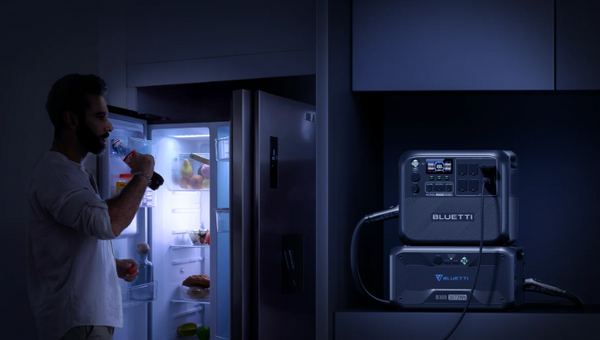Solar panels, also known as photovoltaics (PV), capture energy from the sun and convert it into electricity that you can use in your home or on the go.
With the capacity of solar energy reaching an annual growth rate of 25% in the last five years, solar has become the fastest growing renewable power source.
With a rise in demand for renewable energy sources, more homeowners are looking to invest in solar panels. Naturally, there are many questions about how solar panels work and what advantages they offer. So, let¡¯s break it down.

How is Electricity from Solar Energy Produced?
Solar panels are usually built with layers of semi-conducting materials such as silicon. Each layer has its own electronic properties that absorb sunlight and convert it into electricity.
The silicon is installed in a metal panel frame with a glass casing that offers durability and protection to the photovoltaic cells. When photons, or particles of light hit the layer of silicon, they transform into positively charged electrons.
When light interacts with the panels, the PV cells are charged, and an electric current is created. Using an inverter, the DC electricity is then converted to an alternating current. This needs to be done as AC is the type of electrical current required when using regular wall sockets.
As well as electricity, heat energy can also be generated from the sun. This happens when there is an excess of energy that cannot be turned into electricity. This will, in turn, heat up the solar panels. If the temperature of the panels rises too high, the photovoltaic cell¡¯s energy production will reduce, therefore negatively effecting the efficiency of the solar panel. To combat this, solar panels have a layer of insulation to help protect against overheating.
What are the Advantages of Solar Power?
Despite solar power receiving wide criticism for being expensive or inefficient, the benefits of solar energy are hard to disprove. From helping the environment to supporting the private economy, the list of advantages is a long one.
Renewable Energy
One of the largest benefits is that solar power is a truly renewable energy source. The power from solar energy can be harnessed and enjoyed all over the world and causes no emissions of greenhouse gasses after installation.
Turning to pollution-free solutions is necessary for the health of our planet, and solar power is a quick and easy way to reduce the use of fossil fuels in our daily lives.
Versatile Panels
Solar panels can be installed in a wide range of places, from domestic settings such as buildings and homes, to larger scale facilities like farms. They benefit these different landscapes in many ways.
In the countryside, solar farms are helping to support local biodiversity by providing an undisturbed habitat for animals such as bees, butterflies, and nesting birds.
In cities, roof top panels can help to combat fuel poverty. This creates a positive impact on the domestic life, finances and well-being of the people who live there.
No Noise Pollution
Solar panel installations are non-intrusive and therefore can be installed with minimal disturbance.
The absence of moving parts means that they are completely noiseless and will cause no loud disruptions.
Safety
Solar panels are very safe. As they are mostly made of silicon, there is no risk of photovoltaic cells leaking or emitting any toxins or fumes.
In 2020, 5.2% of the EU¡¯s total electricity production came from solar energy. As an energy source, it is reported that solar is growing at the highest rate globally in the EU, with its cost decreasing by 82% over the last 10 years. It is clear that our reliance on fossil fuels is starting to wane.
Reducing Energy Costs
By using the renewable energy that your solar panels produce, you can harvest enough electricity to power your entire house!
Depending on the size of your solar systems and your levels of usage, you could save large amounts of money on energy bills.
There is also the opportunity to sell your surplus energy back to the grid if you have generated more than you can use.
Do Solar Panels Work on Cloudy Days?
The short answer is yes. Solar panels only require some level of daylight to harness the sun¡¯s energy. This means that the rate they generate electricity varies depending on the amount of direct sunlight.
Solar panels react to visible light spectrum. This means that if there is enough light to see, then there is enough light to generate electricity.
To find out more about solar power in overcast weather conditions, check out our blog here.

How Are We Developing Effective Solar Systems?
Here at Bluetti, we believe we are doing solar power right. Our solar products are built with monocrystalline solar cells that can convert up to 23.4% of sunlight into solar energy, meaning you can efficiently charge your solar generators even in bad weather.
All of our generators are built to last and are designed to withstand any scratches or water damage to ensure that your solar system will be as efficient as it can be, for as long as it can be.
If you¡¯re looking for solar power on the go, we offer foldable and portable solar products that can be easily transported- perfect for a camping trip!
Check out our range of solar panels and generators here!



